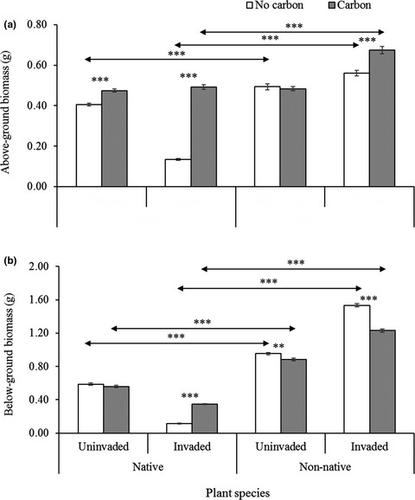当前位置:
X-MOL 学术
›
Ecol. Evol.
›
论文详情
Our official English website, www.x-mol.net, welcomes your
feedback! (Note: you will need to create a separate account there.)
Allelopathy and its coevolutionary implications between native and non-native neighbors of invasive Cynara cardunculus L.
Ecology and Evolution ( IF 2.3 ) Pub Date : 2020-06-28 , DOI: 10.1002/ece3.6472 Md Nazim Uddin 1, 2 , Takashi Asaeda 2, 3 , Shahana H Shampa 1 , Randall W Robinson 1
Ecology and Evolution ( IF 2.3 ) Pub Date : 2020-06-28 , DOI: 10.1002/ece3.6472 Md Nazim Uddin 1, 2 , Takashi Asaeda 2, 3 , Shahana H Shampa 1 , Randall W Robinson 1
Affiliation

|
Invasive plants apply new selection pressures on neighbor plant species by different means including allelopathy. Recent evidence shows allelopathy functions as remarkably influential mediator for invaders to be successful in their invaded range. However, few studies have determined whether native and non‐native species co‐occurring with invaders have evolved tolerance to allelopathy. In this study, we conducted germination and growth experiments to evaluate whether co‐occurring native Juncus pallidus and non‐native Lolium rigidum species may evolve tolerance to the allelochemicals induced by Cyanara cardunculus in Australian agricultural fields. The test species were germinated and grown in pots filled with collected invaded and uninvaded rhizosphere soil of C. cardunculus with and without activated carbon (AC). Additionally, a separate experiment was done to differentiate the direct effects of AC on the test species. The soil properties showed invaded rhizosphere soils had higher total phenolic and lower pH compared with uninvaded soils. We found significant reduction of germination percentage and seedling growth in terms of above‐ and belowground biomass, and maximum plant height and root length of native in the invaded rhizosphere soil of C. cardunculus , but little effect on non‐native grass species. Even soil manipulated with AC showed no significant differences in the measured parameters of non‐native except aboveground biomass. Taken together, the results indicate allelochemicals induced by C. cardunculus exert more suppressive effects on native than non‐native linking the coevolved tolerance of those.
中文翻译:

入侵性 Cynara cardunculus L 的本地和非本地邻居之间的化感作用及其共同进化意义。
入侵植物通过包括化感作用在内的不同方式对邻近植物物种施加新的选择压力。最近的证据表明化感作用对于入侵者在其入侵范围内取得成功具有非常重要的影响力。然而,很少有研究确定与入侵者共存的本地和非本地物种是否进化出了对化感作用的耐受性。在这项研究中,我们进行了发芽和生长实验,以评估同时存在的本土苍白灯心草和非本土黑麦草物种是否可能进化出对澳大利亚农田中由卡芩草诱导的化感化学的耐受性。测试物种在装有收集的入侵和未入侵的C. cardunculus根际土壤的盆中发芽和生长,其中有或没有活性炭(AC)。此外,还进行了一项单独的实验来区分 AC 对测试物种的直接影响。土壤特性显示,与未入侵土壤相比,入侵根际土壤的总酚含量较高,pH 值较低。我们发现,在C. cardunculus入侵的根际土壤中,本地草种的地上和地下生物量、最大株高和根长显着降低,但对非本地草种影响不大。即使用活性炭处理的土壤,除了地上生物量之外,非本地的测量参数也没有显着差异。综上所述,结果表明,由C. cardunculus诱导的化感物质对本地生物比非本地生物发挥更多的抑制作用,这与这些生物的共同进化耐受性有关。
更新日期:2020-07-30
中文翻译:

入侵性 Cynara cardunculus L 的本地和非本地邻居之间的化感作用及其共同进化意义。
入侵植物通过包括化感作用在内的不同方式对邻近植物物种施加新的选择压力。最近的证据表明化感作用对于入侵者在其入侵范围内取得成功具有非常重要的影响力。然而,很少有研究确定与入侵者共存的本地和非本地物种是否进化出了对化感作用的耐受性。在这项研究中,我们进行了发芽和生长实验,以评估同时存在的本土苍白灯心草和非本土黑麦草物种是否可能进化出对澳大利亚农田中由卡芩草诱导的化感化学的耐受性。测试物种在装有收集的入侵和未入侵的C. cardunculus根际土壤的盆中发芽和生长,其中有或没有活性炭(AC)。此外,还进行了一项单独的实验来区分 AC 对测试物种的直接影响。土壤特性显示,与未入侵土壤相比,入侵根际土壤的总酚含量较高,pH 值较低。我们发现,在C. cardunculus入侵的根际土壤中,本地草种的地上和地下生物量、最大株高和根长显着降低,但对非本地草种影响不大。即使用活性炭处理的土壤,除了地上生物量之外,非本地的测量参数也没有显着差异。综上所述,结果表明,由C. cardunculus诱导的化感物质对本地生物比非本地生物发挥更多的抑制作用,这与这些生物的共同进化耐受性有关。











































 京公网安备 11010802027423号
京公网安备 11010802027423号